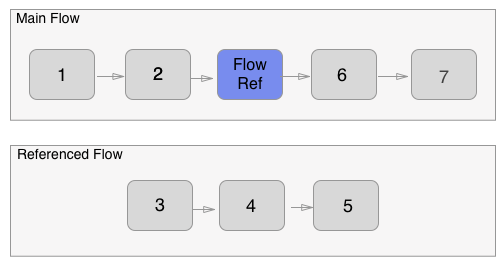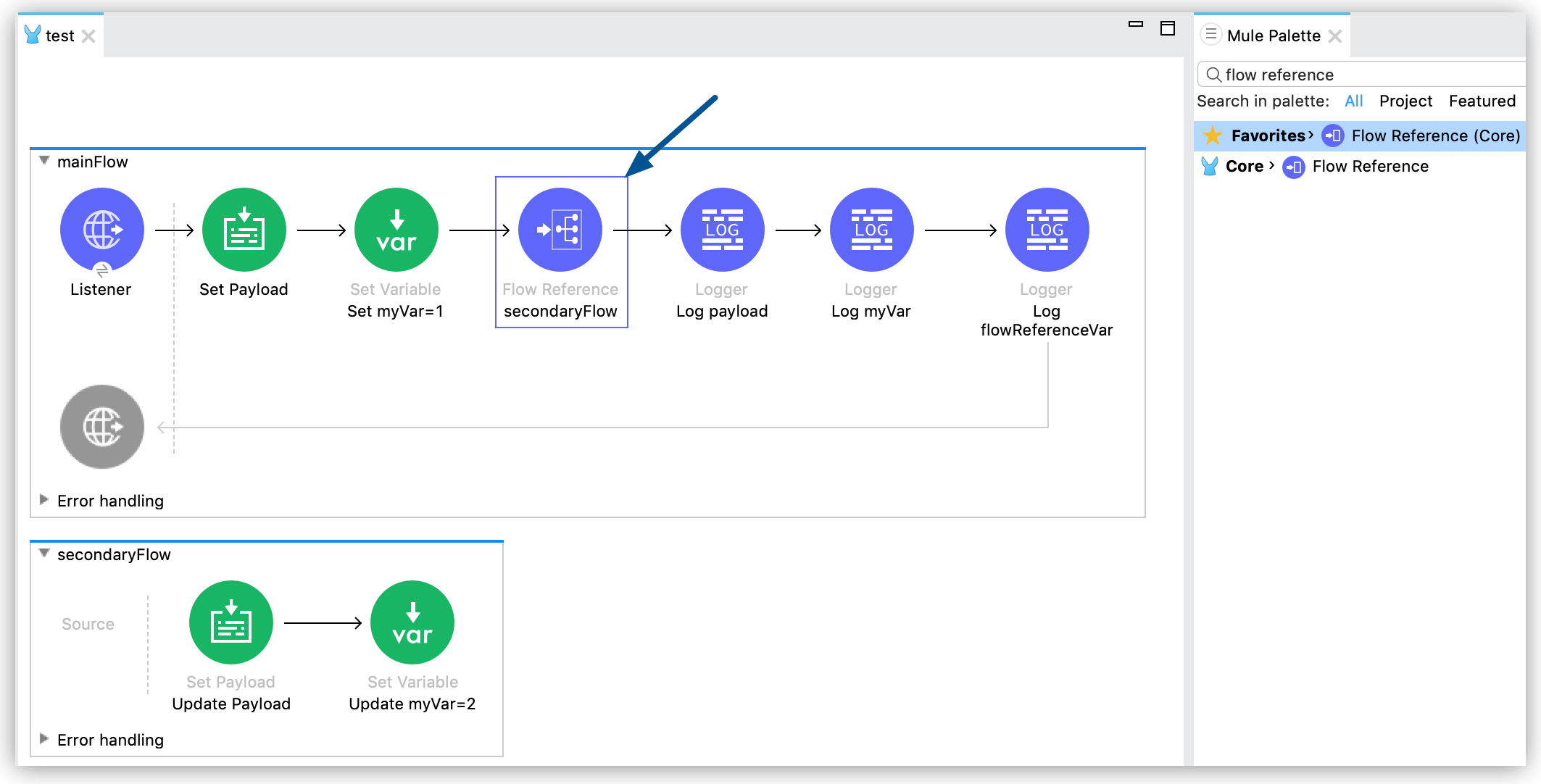
Flow Reference Component
|
Standard Support for Mule 4.1 ended on November 2, 2020, and this version of Mule reached its End of Life on November 2, 2022, when Extended Support ended. Deployments of new applications to CloudHub that use this version of Mule are no longer allowed. Only in-place updates to applications are permitted. MuleSoft recommends that you upgrade to the latest version of Mule 4 that is in Standard Support so that your applications run with the latest fixes and security enhancements. |
Flow Reference routes the Mule event to another flow or subflow, executes all processors in the referenced flow, and then routes the event back within the same Mule application. The following diagram shows the order of processing when one flow references another:

When the main flow is triggered, the Mule event travels through and executes the flow until the event reaches the Flow Reference. The event then travels through and executes the referenced flow from beginning to end, and then returns to the main flow.
This process enables you to treat the entire referenced flow like a single component in your current flow.
Flow Reference breaks the Mule application into discrete and reusable units. For example, a flow that lists files on a regular basis might reference another flow that processes the output of the List operation. Instead of appending all the processing steps to the flow that lists the files, you can append a Flow Reference that points to the processing flow.
Configure a Flow Reference
To configure a Flow Reference component, follow these steps in Anypoint Studio:
-
Drag the Flow Reference component from Mule Palette to the point in your flow where you want to create the call to the referenced flow:

-
Open the Flow Reference properties and specify the flow you want to reference in Flow name:

Enrich Content with a Flow Reference Target Variable
Sometimes you need to execute a flow that uses the current payload and variables, but you want the Mule message to remain unchanged after such process. In this case, you can use a target variable to store the results of the referenced flow processing without changing the original message.
You can store the result of a Flow Reference call in a target variable by configuring the following fields in your Flow Reference properties:
-
Target: Name of the variable that the Flow Reference creates to store the result of the processed message.
-
Target Value: An expression that evaluates against the operation’s output. The result of this evaluation is stored in the defined target variable.
Considerations when Using a Target Variable
Setting the target variable in a Flow Reference component causes the original message to remain unchanged. This means that any modification to the payload or to the variables that occur in the referenced flow revert after the referenced flow finishes executing its processors, returning the payload and variables to their original values.
Alternatively, if you do not define a target variable, any modification that occurs to the payload or to the variables in the referenced flow persist after the referenced flow finishes its execution, changing the original value of the payload or variables.
XML Example of Flow Reference
The following XML code represents the project created in Configure a Flow Reference, adding the target variable flowReferenceVar, which stores the result of the secondary flow called by the Flow Reference component. This variable is then used in the main flow by logging vars.flowReferenceVar:
<!-- Main flow -->
<flow name="mainFlow" >
<http:listener doc:name="Listener" config-ref="HTTP_Listener_config" path="test"/>
<set-payload value="Original payload" doc:name="Set Payload" />
<set-variable value="1" doc:name="Set myVar=1" variableName="myVar"/>
<!-- Flow Reference component with target variable flowReferenceVar -->
<flow-ref doc:name="secondaryFlow" name="secondaryFlow" target="flowReferenceVar"/>
<logger level="INFO" doc:name="Log payload" message='#["Payload = " ++ payload]'/>
<logger level="INFO" doc:name="Log myVar" message='#["myVar = " ++ vars.myVar]'/>
<logger level="INFO" doc:name="Log flowReferenceVar" message='#["flowReferenceVar = " ++ vars.flowReferenceVar]'/>
</flow>
<!-- Secondary flow that is referenced from Main flow-->
<flow name="secondaryFlow" doc:id="044ece19-aa71-4fc9-ad34-8df655dd59a8" >
<set-payload value="Modified payload" doc:name="Update Payload" />
<set-variable value="2" doc:name="Update myVar=2" variableName="myVar"/>
</flow>The following log represents the output of the example application after its execution:
INFO LoggerMessageProcessor: Payload = Original payload INFO LoggerMessageProcessor: myVar = 1 INFO LoggerMessageProcessor: flowReferenceVar = Modified payload
If you remove target="flowReferenceVar" from the Flow Reference component, the application returns the following output:
INFO LoggerMessageProcessor: Payload = Modified payload INFO LoggerMessageProcessor: myVar = 2 INFO LoggerMessageProcessor: flowReferenceVar = null
The logs are shortened to improve readability.



